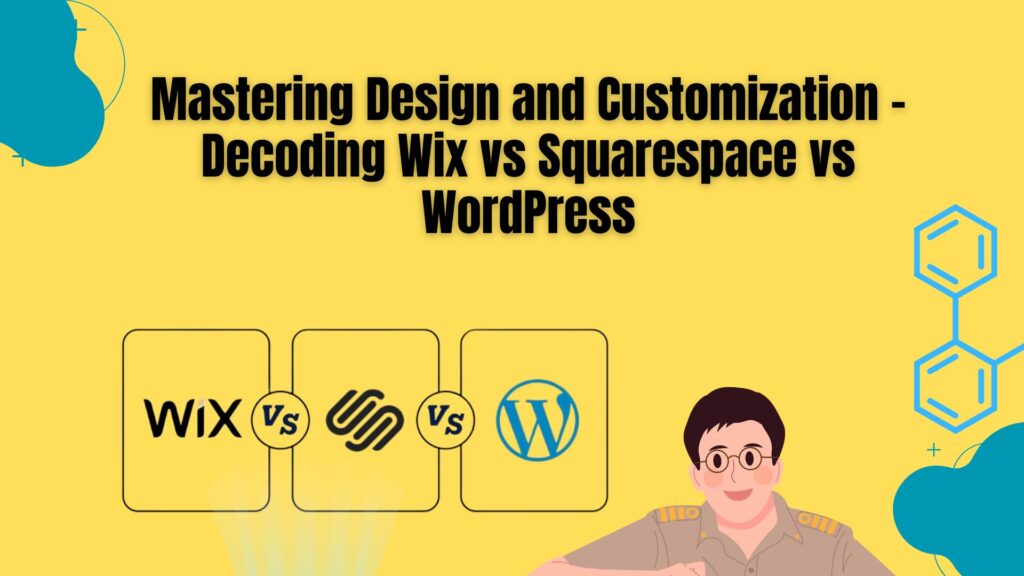Intro Design and Customization
I’m here to craft an article that delves deep into the intricacies of Wix vs Squarespace vs WordPress when it comes to Design and Customization. Let’s explore these platforms’ offerings in a manner that’s not just informative but captivating.
Design Aesthetics – An Insightful Comparison
Wix:
Wix thrives on its visually appealing templates and a user-friendly drag-and-drop interface. The platform spoils its users with an array of professionally designed themes across various industries. The Wix ADI (Artificial Design Intelligence) further streamlines the design process, providing personalized design suggestions based on user inputs.
Squarespace:
Squarespace, synonymous with elegant design, offers sleek and sophisticated templates. Its emphasis on minimalism and aesthetic finesse attracts those inclined towards a polished visual appeal. The platform’s intuitive interface ensures a seamless customization experience.
WordPress:
WordPress, renowned for its versatility, grants unparalleled freedom in design. The platform’s vast repository of themes and plugins allows users to transform their websites into bespoke creations. Its open-source nature empowers users to delve into the code, tailoring every aspect of their website’s design.
Customization Capabilities: Unveiling the Potential
Wix:
While Wix simplifies the design process with its intuitive interface, its customization options might have limitations for those seeking intricate modifications. However, for users looking for a quick and visually appealing website, Wix provides ample customization tools.
Squarespace:
Squarespace strikes a balance between simplicity and customization. Its editor offers a range of customization options without overwhelming users. From altering layouts to fine-tuning fonts and colors, Squarespace empowers users to personalize their websites effortlessly.
WordPress:
WordPress stands tall in the realm of customization. Its open-source nature allows for limitless tweaking. With access to a vast selection of plugins and the ability to edit code directly, WordPress grants users the freedom to create highly personalized websites, catering to diverse needs.
User Experience: Navigating the Platforms

Wix:
Wix’s user-friendly interface ensures a smooth navigation experience. Its intuitive drag-and-drop system simplifies the process of adding, rearranging, and editing elements on the website. For beginners and those seeking a hassle-free interface, Wix proves to be a comfortable choice.
Squarespace:
Squarespace’s structured editor and seamless UI cater to users desiring a balance between simplicity and sophistication. Its guided approach ensures a user-friendly experience without compromising on design flexibility.
WordPress:
WordPress, known for its robustness, might pose a slight learning curve for beginners. However, its extensive documentation and community support aid users in navigating through its vast ecosystem. The platform’s interface might seem more intricate initially, but it offers unparalleled depth and control.
Decision-Making Factors: What to Consider
Purpose and Vision:
Determining the primary goal of your website is crucial. Are you showcasing a portfolio, running an e-commerce venture, or managing a content-rich blog? Aligning your website’s purpose with the platform’s strengths is pivotal in making the right choice.
Level of Control vs. Ease of Use:
Balancing the need for customization with the comfort of use is key. Wix and Squarespace offer a more streamlined approach, whereas WordPress empowers users with extensive control, albeit with a learning curve.
Support and Resources:
Consider the support infrastructure provided by each platform. Wix and Squarespace offer comprehensive support, while WordPress relies on its extensive community and third-party support. Assessing your need for guidance influences the decision-making process.
Final Thoughts:
Choosing between Wix vs Squarespace vs WordPress for design and customization entails understanding your website’s specific requirements. Wix and Squarespace excel in simplicity and visual appeal, while WordPress beckons those seeking extensive customization and control.


